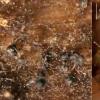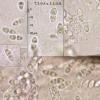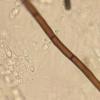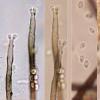
13-02-2026 18:05
Margot en Geert VullingsOn February 9, 2026, we found these small hairy di

13-02-2026 03:30
Hello! I found these immersed perithecia on a stic

12-02-2026 21:34
patrice CallardBonjour, la face inférieure des feuilles ce certa

11-02-2026 22:15
 William Slosse
William Slosse
Today, February 11, 2026, we found the following R

12-02-2026 14:55
Thomas Læssøehttps://svampe.databasen.org/observations/10581810

11-02-2026 19:28
 Lothar Krieglsteiner
Lothar Krieglsteiner
on small deciduous twig on the ground in forest wi

25-04-2025 17:24
Stefan BlaserHi everybody, This collection was collected by J�

10-02-2026 17:42
 Bernard CLESSE
Bernard CLESSE
Bonjour à toutes et tous,Pourriez-vous me donner
Chaetosphaeria on Quercus
Enrique Rubio,
26-11-2012 17:39
We have collected these small (up to 0.15 mm), gregarious, black, superficial, globose and hairy perithecia on Quercus wood.
The prithecia grew among conidiomata of a dematiaceous mould and their ascospores breaking into equal-sized part-spores of 7-9 x 3-4 microns.
Could this fungus be Chaetosphaeria vermicularioides or Ch. preussii? Can these conidiomata belong to the anamorphic state?
Many thanks for your help
Alain GARDIENNET,
27-11-2012 08:54
Re : Chaetosphaeria on Quercus
Hi Enrique,
You are near to the solution.
It seems to be a Chloridium anamorph.
Can you give exactly the size of ascospores or ascospores part if it's really fragmented (is it ?) and conidiospores. Your fungus is probably in the group : preussi/vermicularioides/myriocarpa/lentomita/barbicincta.
Have you Reblova's paper ?
Amitiés,
Alain
You are near to the solution.
It seems to be a Chloridium anamorph.
Can you give exactly the size of ascospores or ascospores part if it's really fragmented (is it ?) and conidiospores. Your fungus is probably in the group : preussi/vermicularioides/myriocarpa/lentomita/barbicincta.
Have you Reblova's paper ?
Amitiés,
Alain
Jacques Fournier,
27-11-2012 09:25

Re : Chaetosphaeria on Quercus
Hola Enrique,
d'accord avec toi et Alain. Je pense que C. vermicularioides est l'espèce qui correspond le mieux à ta récolte à cause de la conidiogenèse multiple que l'on voit bien sur ta photo de la collerette terminale. La largeur des spores correspond aussi mieux qu'à C. preussii.
Malheureusement je ne connais pas bien ces espèces et un avis plus compétent serait le bienvenu.
Amitiés,
Jacques
d'accord avec toi et Alain. Je pense que C. vermicularioides est l'espèce qui correspond le mieux à ta récolte à cause de la conidiogenèse multiple que l'on voit bien sur ta photo de la collerette terminale. La largeur des spores correspond aussi mieux qu'à C. preussii.
Malheureusement je ne connais pas bien ces espèces et un avis plus compétent serait le bienvenu.
Amitiés,
Jacques
Enrique Rubio,
27-11-2012 19:51
Re : Chaetosphaeria on Quercus
Hi Alain and Jacques
The ascospores are fully disarticulate at maturity and the part-spores reaching 3.5-4.7 x 2.7-3.7 microns.
The conidia are 4.6-5.4 x 2.7-2.8 microns.
No. I have not Reblova´s paper
Many thanks to both
The ascospores are fully disarticulate at maturity and the part-spores reaching 3.5-4.7 x 2.7-3.7 microns.
The conidia are 4.6-5.4 x 2.7-2.8 microns.
No. I have not Reblova´s paper
Many thanks to both
Alain GARDIENNET,
27-11-2012 20:08
Re : Chaetosphaeria on Quercus
Ce papier est dans le SIM 45 mais je te l'envoie dans ta boîte.
Alain
Alain



